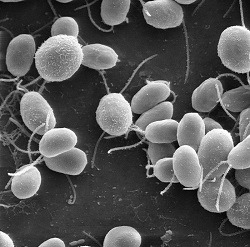 Researchers in California have found a faster way to figure out more of the secrets of photosynthesis, and that could lead to new strains of algae better for biodiesel. Officials with the Carnegie Institution for Science say they have developed a new technique that will accelerate genetic characterization of photosynthesis:
Researchers in California have found a faster way to figure out more of the secrets of photosynthesis, and that could lead to new strains of algae better for biodiesel. Officials with the Carnegie Institution for Science say they have developed a new technique that will accelerate genetic characterization of photosynthesis:
A type of single-cell green algae called Chlamydomonas reinhardtii is a leading subject for photosynthesis research. Despite its importance in the research world, few tools are available for characterizing the functions of its genes.
A team including Carnegie’s Martin Jonikas developed a highly sophisticated tool that will transform the work of plant geneticists by making large-scale genetic characterization of Chlamydomonas mutants possible for the first time. Their work is published by The Plant Cell.
Their tool is a major step forward in the goal of identifying the genes that are necessary for photosynthesis, as well as other cellular functions such as the production of oily fats that are crucial for biofuel development. The use of similar tools for non-photosynthetic, single-celled organisms has revolutionized the understanding of cellular processes in bacteria and yeast, as well as animals.

